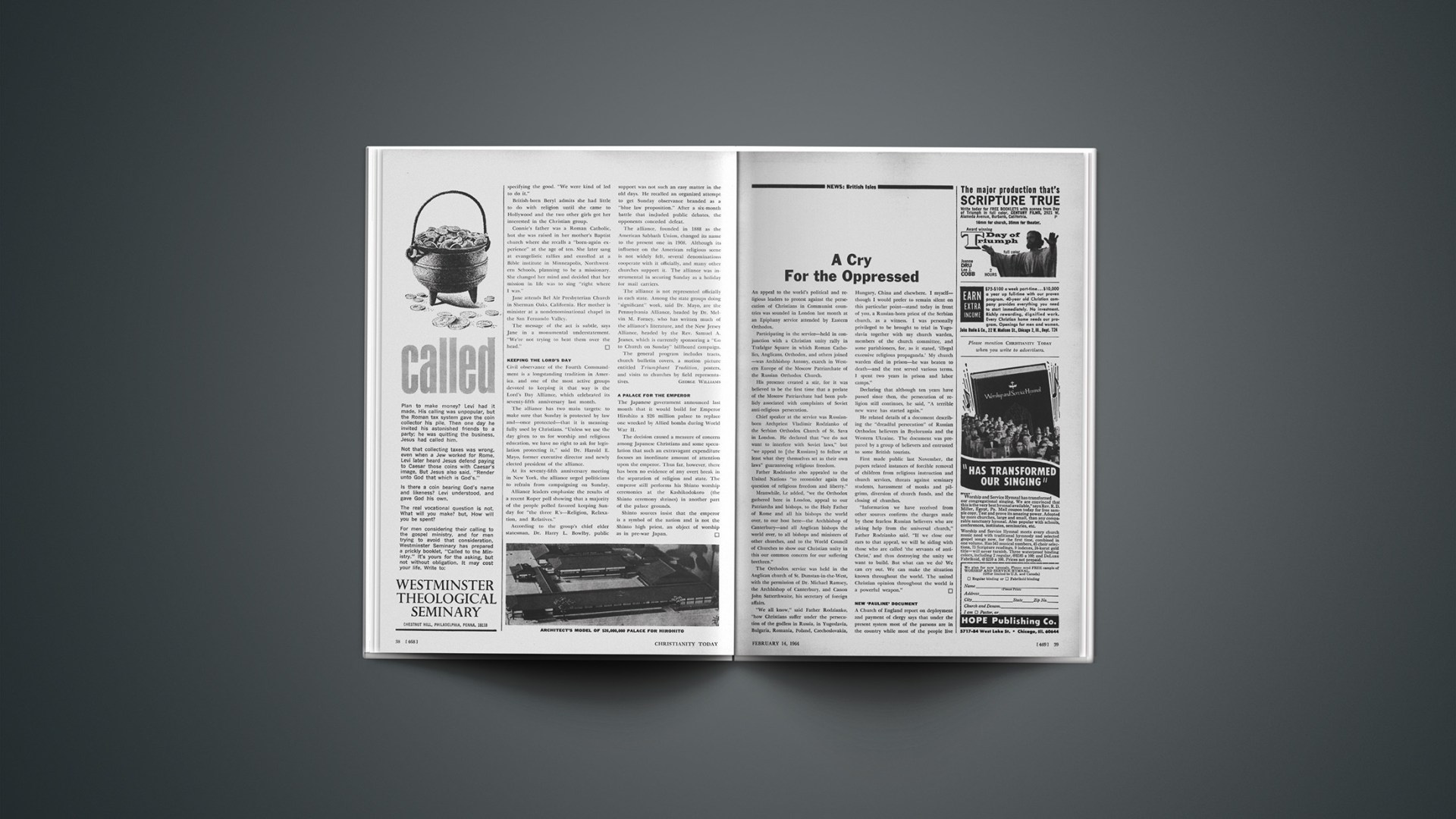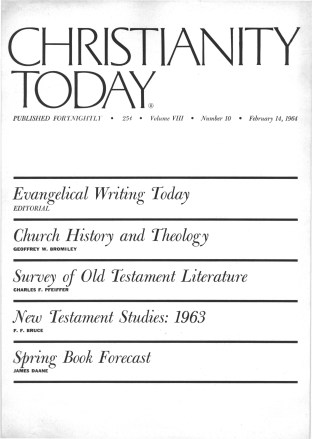An appeal to the world’s political and religious leaders to protest against the persecution of Christians in Communist countries was sounded in London last month at an Epiphany service attended by Eastern Orthodox.
Participating in the service—held in conjunction with a Christian unity rally in Trafalgar Square in which Roman Catholics, Anglicans, Orthodox, and others joined—was Archbishop Antony, exarch in Western Europe of the Moscow Patriarchate of the Russian Orthodox Church.
His presence created a stir, for it was believed to be the first time that a prelate of the Moscow Patriarchate had been publicly associated with complaints of Soviet anti-religious persecution.
Chief speaker at the service was Russian-born Archpriest Vladimir Rodzianko of the Serbian Orthodox Church of St. Sava in London. He declared that “we do not want to interfere with Soviet laws,” but “we appeal to [the Russians] to follow at least what they themselves set as their own laws” guaranteeing religious freedom.
Father Rodzianko also appealed to the United Nations “to reconsider again the question of religious freedom and liberty.”
Meanwhile, he added, “we the Orthodox gathered here in London, appeal to our Patriarchs and bishops, to the Holy Father of Rome and all his bishops the world over, to our host here—the Archbishop of Canterbury—and all Anglican bishops the world over, to all bishops and ministers of other churches, and to the World Council of Churches to show our Christian unity in this our common concern for our suffering brethren.”
The Orthodox service was held in the Anglican church of St. Dunstan-in-the-West, with the permission of Dr. Michael Ramsey, the Archbishop of Canterbury, and Canon John Satterthwaite, his secretary of foreign affairs.
“We all know,” said Father Rodzianko, “how Christians suffer under the persecution of the godless in Russia, in Yugoslavia, Bulgaria, Romania, Poland, Czechoslovakia, Hungary, China and elsewhere. I myself—though I would prefer to remain silent on this particular point—stand today in front of you, a Russian-born priest of the Serbian church, as a witness. I was personally privileged to be brought to trial in Yugoslavia together with my church warden, members of the church committee, and some parishioners, for, as it stated, ‘illegal excessive religious propaganda.’ My church warden died in prison—he was beaten to death—and the rest served various terms. I spent two years in prison and labor camps.”
Declaring that although ten years have passed since then, the persecution of religion still continues, he said, “A terrible new wave has started again.”
He related details of a document describing the “dreadful persecution” of Russian Orthodox believers in Byelorussia and the Western Ukraine. The document was prepared by a group of believers and entrusted to some British tourists.
First made public last November, the papers related instances of forcible removal of children from religious instruction and church services, threats against seminary students, harassment of monks and pilgrims, diversion of church funds, and the closing of churches.
“Information we have received from other sources confirms the charges made by these fearless Russian believers who are asking help from the universal church,” Father Rodzianko said. “If we close our ears to that appeal, we will be siding with those who are called ‘the servants of anti-Christ,’ and thus destroying the unity we want to build. But what can we do? We can cry out. We can make the situation known throughout the world. The united Christian opinion throughout the world is a powerful weapon.”
New ‘Pauline’ Document
A Church of England report on deployment and payment of clergy says that under the present system most of the parsons are in the country while most of the people live in the towns. Main proposals of the 300-page document, authored by 58-year-old sociologist Leslie Paul, include direction of ordinands for the first five years of their ministry, creation of new parishes with a team ministry, abolition of patronage and of the anachronism that makes it all but impossible to remove a clergyman from his living except for criminal offenses or immorality.
Scheduled for discussion this month at the Church Assembly, the report quickly came under fire. An archdeacon referred to “a planner’s Pelagian paradise where administrative techniques are substitutes for faith in God and prayer.” Layman Ivor Bulmer-Thomas suggested the new proposals would bring about the reverse of much-needed revival in the Church of England, the decline of which he attributed to “clergymen denying the basic truths, from [Thomas] Arnold in 1832 to the Bishop of Woolwich and the Cambridge theologians in 1964.” But the report has influential supporters, including Dr. Kenneth Riches, Bishop of Lincoln, who insisted that the reforms are long overdue.
J. D. DOUGLAS
The Power Of A Curse
An unscheduled item at Morning Prayer startled worshipers this month in the rural parish of Bramber in Southern England. Dressed in vestments and with outstretched arms, 76-year-old rector Ernest Streete faced his congregation and declaimed: “I pronounce a curse on those who touch God’s acre in this churchyard. May their days be of anguish and sorrow, and may God have mercy on their souls.”
The clerical curse resulted from a raid on the church’s graveyard, variously attributed to vandals and to Black Magic devotees. A stone cross weighing a hundred pounds had been wrenched from a grave and propped up against the church door, tombstone angels had been beheaded, and black mass signs were scrawled on the porch. Attempts to break into the 900-year-old church itself had failed.
“My curse shall stand,” Mr. Streete said, “and I will not relent until they apologize and ask for forgiveness. What they have done is a tremendous insult to the Almighty.”
Next morning, finding that much of the damage had been repaired, he announced that he would arrange for the curse to be lifted the following Sunday. Though Mr. Streete later heard that police had done the repair work, he professed himself in no doubt of the efficacy of his curse.
This is not the rector’s first successful curse: in a former parish a similar malediction pronounced on thieves who rifled the church money boxes was followed by the return of most of the cash, anonymously.
The Bishop of Chichester, Dr. Roger Wilson, commented that the rector had done this on his own initiative, and added: “There is nothing in church ritual that allows this sort of thing.”
J. D. DOUGLAS
Making It Legal
“It would seem that certain positions of influence are sometimes barred to men who are determined to remain loyal to the Prayer-Book,” said the Vicar of Islington, the Rev. R. Peter Johnston, in his presidential address to the 130th Islington Clerical Conference at Westminster this month. Illustrating the kind of action involved in such loyalty, he cited evangelical opposition to a bill, due to come up for final approval at the February meeting of the Anglican Church Assembly, which would legalize the wearing of Mass vestments (Anglo-Catholics have long ignored the present prohibition, which is never enforced).
“Granted that to many these garments have no doctrinal significance,” continued Mr. Johnston, “to some at least they are closely linked with Eucharistic teaching which undermines the doctrine of justification by faith.” Should this measure become law, evangelicals will experience increasing difficulty in playing their full part in the life of the Church of England. If the Church Assembly gives its expected sanction the bill will be submitted for approval to Parliament where, despite lobbying by the hierarchy, considerable opposition is anticipated.
Mr. Johnston summarized evangelical objections to the proposed Anglican-Methodist merger (see CHRISTIANITY TODAY, News, March 15, 1963). He denied the implication in that report that episcopal ordination was essential for a valid ministry, and asserted that its view of the priesthood stemmed rather from the Oxford Movement than from the formularies of the Church of England. Mr. Johnston predicted that many Methodists would refuse to participate, and that opposition would close the door to reunion with the other English free churches for many years to come. He suggested that all the major denominations in England might explore the possibility of reunion along the lines of the Church of South India, a feature of which is the acceptance of one another’s ministries as they are. “We should do all in our power to avoid wounding the consciences of those who differ from us,” he concluded; “on the other hand, Tractarian principles must not be allowed to determine our relationship with other branches of the Church of Christ.”
J. D. DOUGLAS










